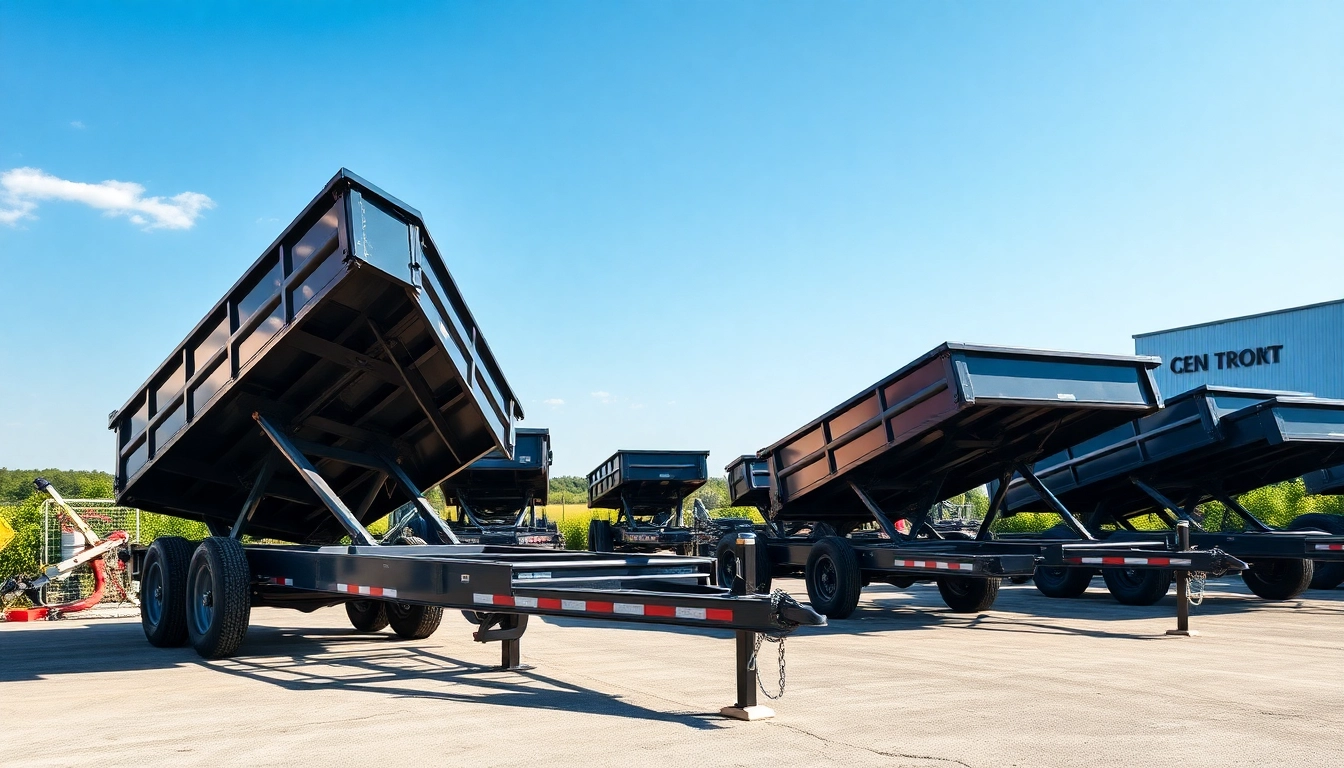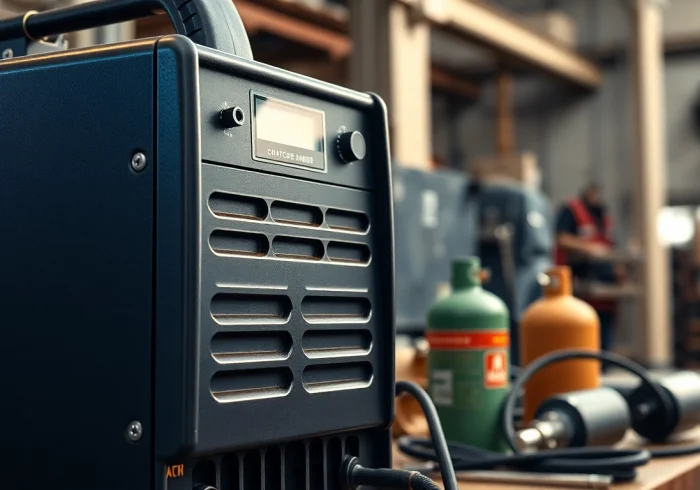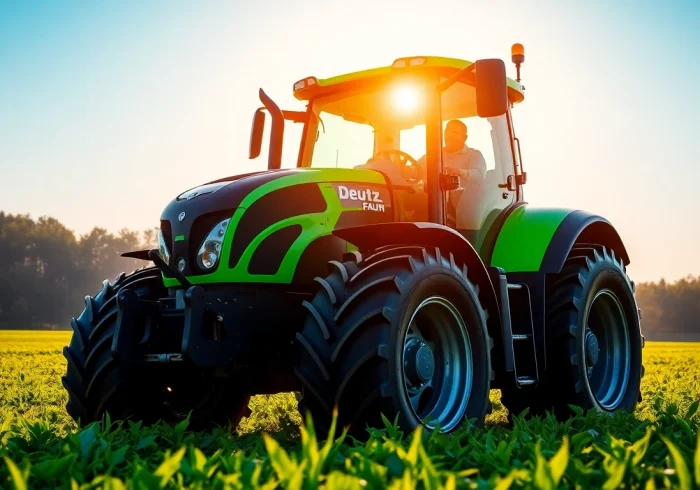Understanding Hydraulic Dump Trailers
What Are Hydraulic Dump Trailers?
Hydraulic dump trailers are specialized trailers designed for the efficient transport and unloading of materials. Utilizing a hydraulic system, these trailers can easily lift and tilt to release their cargo quickly, making them invaluable for a range of applications. Typically made from robust materials, they can handle heavy loads, providing a durable solution for both commercial and residential needs.
Common Uses and Applications
Hydraulic dump trailers serve a multitude of purposes across various industries:
- Construction: Commonly used on job sites to transport debris, construction materials, and equipment.
- Landscaping: Ideal for moving mulch, soil, and other landscaping materials.
- Agriculture: Used to haul feed, grain, and produce in farm settings.
- Residential: Homeowners can utilize them for DIY projects, yard cleanups, and moving large items.
Advantages of Hydraulic Systems
Choosing hydraulic dump trailers comes with several key advantages:
- Ease of Use: Hydraulic systems allow for effortless operation; lifting and lowering the trailer can be done with the push of a button.
- Speed: Hydraulic dump trailers can unload their contents quickly, significantly reducing downtime compared to manual unloading.
- Greater Payload Capacity: These trailers are designed to carry heavy loads while maintaining stability during transport.
- Versatile Design: Many models can be customized with various features, including ramps, side extensions, and additional hydraulic options.
Choosing the Right Hydraulic Dump Trailer
Key Features to Look For
When selecting a hydraulic dump trailer, consider these critical features:
- Hydraulic System Type: Electric vs. manual; electric systems offer convenience, while manual systems may be more cost-effective.
- Frame Construction: Look for trailers made from high-strength steel or aluminum for enhanced durability.
- Gate Options: Choose between barn doors, spreader gates, or slide-out ramps depending on your unloading requirements.
- Axle Configuration: Single or tandem axles depend on the load size and the towing vehicle’s capacity.
Size and Capacity Considerations
Hydraulic dump trailers come in various sizes to accommodate different hauling needs:
- Payload Capacity: This is typically measured in tons. Ensure the trailer can handle your expected load.
- Dimensions: Length and width should be selected based on your intended use. Consider space for maneuvering and storage.
- Height: If unloading into a truck or other container, ensure the dump height meets your requirements.
Trailer Materials and Durability
The material of the trailer significantly impacts its longevity and performance:
- Steel Trailers: Generally heavier and more durable, suitable for heavy loads.
- Aluminum Trailers: Lighter and resistant to rust, ideal for lighter applications but may have lower load capacities.
- Composite Materials: Emerging options provide lightweight solutions without sacrificing strength.
Where to Buy Hydraulic Dump Trailers
Top Online Retailers and Dealerships
Finding hydraulic dump trailers for sale can be done through various channels:
- Dealerships: Local dealerships often offer brand-new models and provide after-sales service.
- Online Retailers: Websites like Trailer Superstore, Sure-Trac, and others provide extensive inventories with competitive pricing.
- Auctions: Online auction sites also list new and used dump trailers, providing avenues for more affordable options.
Evaluating Used vs New Trailers
When considering your purchase, you may come across both new and used hydraulic dump trailers:
- New Trailers: Often come with warranties and the latest technology but are generally more expensive.
- Used Trailers: Can be significantly cheaper but require careful inspection for wear and tear. Look for trailers with maintenance records.
Local vs National Suppliers
The choice between local and national suppliers could depend on your unique needs:
- Local Suppliers: May offer personalized service and knowledge of local regulations.
- National Suppliers: Often provide a larger selection, competitive prices, and availability across regions.
Pricing and Financing Options
Typical Price Ranges for New and Used Trailers
The price of hydraulic dump trailers can vary significantly. On average:
- New Trailers: Prices typically range from $5,000 to over $20,000 depending on the model and features.
- Used Trailers: Prices can start at around $2,500 and go up to $15,000 based on age and condition.
Understanding Financing Plans and Loans
If you’re not prepared to pay upfront, various financing options are available:
- Dealership Financing: Many dealerships provide in-house financing options, simplifying the buying process.
- Bank Loans: Traditional bank loans require thorough documentation but may offer better interest rates.
- Leasing Options: Consider leasing if you have fluctuating needs or want to test the trailer’s performance before purchase.
Hidden Costs to Be Aware Of
When budgeting for your trailer, it’s crucial to consider potential hidden costs:
- Registration and Taxes: These costs often ignored can add up significantly.
- Maintenance and Repairs: Factor in ongoing costs for upkeep and potential repairs over time.
- Insurance: Don’t overlook the importance of carrying adequate insurance coverage for your trailer.
Maintaining Your Hydraulic Dump Trailer
Routine Maintenance Tips
Proper maintenance extends the life of your hydraulic dump trailer:
- Regular Inspections: Check the hydraulic system, brakes, and frame for signs of wear.
- Clean Thoroughly: Regular cleaning helps prevent material buildup and rust.
- Lubricate Moving Parts: Keep all moving parts well-lubricated to ensure smooth operation.
Common Repairs and Solutions
Being aware of common repair issues can save time and money:
- Hydraulic Leaks: Keep an eye out for leaks; these can drastically affect performance and may require professional repair.
- Tire Issues: Ensure tires are properly inflated and inspect for uneven wear.
- Electrical Problems: Regularly check wiring and connections if your trailer has an electric hydraulic system.
When to Seek Professional Help
While many maintenance tasks can be performed by the owner, some issues may require professional intervention:
- Complex Hydraulic Issues: If you notice performance issues, a qualified mechanic should inspect the hydraulic system.
- Structural Repairs: Any significant damage to the frame or body should be addressed by professionals.
- Electrical Failures: Having an expert inspect any electrical problems can prevent further damage and ensure safety.



